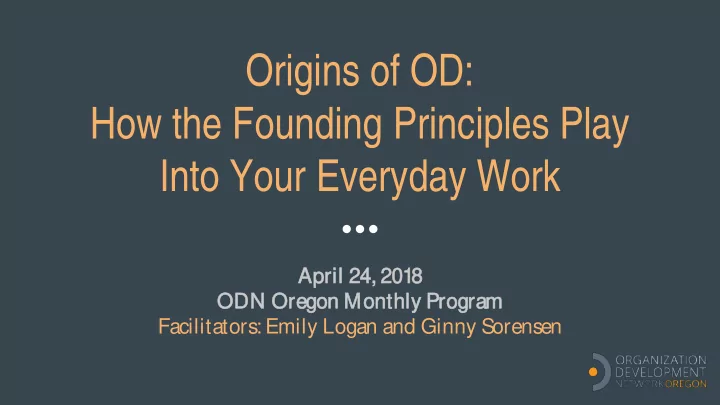

Origins of OD: How the Founding Principles Play Into Your Everyday Work April 24 24, 20 2018 ODN Ore regon Monthly Pro rogra ram Facilitators: Emily Logan and Ginny Sorensen
Agenda ● Who’s here? ● Key OD Theories ● Small Group Activity ● Wrap-up and Reflect
Who’s here tonight? Who’s here tonight? Image credit: https://carfromjapan.com/article/driving-tips/safe-driving-tips-at- intersections/
Key Organization Development Theories
Change Theory: The Origins of Change Management Key Theorist: Kurt Lewin Era: 1930s-40s Unfreez eeze e -> C Chan ange e -> R Refreez eeze ● Unfreeze: Understand current mindset ● Change: Develop new attitudes, behaviors & processes ● Refreeze: Crystallize & institutionalize
Process Consultation Key Theorist: Edgar Schein Era: 1960s ORJI: O Observ rvati tion R Reaction I Interp rpre reta tation J Judgment ● Individual model for decisions & analysis ● Encourages self-awareness and analysis
Systems Theory Key Theorists: Many, across multiple disciplines Era: Varies by discipline Organ anizat ation as as System ● Any Change = Change in the Rest of the System ● Influences = Internal Factors & External Environments
Appreciative Inquiry Key Theorist: David Cooperrider Era: 1980s What is is Goin ing R Rig ight? ● Shift from diagnosis of what’s wrong or missing ● Generative process to explore the best of an organization ● Augment or recreate the good stuff
What Else is Key? What at other er k key t theo eories es, val alues es & & concep epts influen ence e your O OD Prac actice?
Small Group Activity: Applying OD Theories
The Basics ● Split into small groups (we’ll help!) ● Review your group’s scenario ● Review the key theories ● Discuss the reflection questions provided ● Be prepared to share your group and personal reflections
Reflection Questions ● How do the principles discussed come into play in this scenario? ● What steps could you take to ensure this process is improved? ● What are the red flags in this scenario that run counter to the principles listed? ● How would you move forward if the problem were in your hands?
Personal Reflection Think of a a situation y you’ve s e struggled ed with o or o one y you’re e challen enged ed by today. ● Which of the principles we discussed apply? ● Is there a principle you’re NOT applying that could help you move toward a solution?
Let’s Wrap it Up! Wrap-up Image borrowed from: http://ohhappyday.com/2011/12/diy-mini-present-garland/
Thank you! Ginny Sorensen, Consultant Emily Logan, Project Manager Propeller Edify gsorensen@propellerpdx.com emilyrlogan@gmail.com
Reading and Resource List ODN website - What is OD? Organisation Development by Carrie Foster ● Lots of sections of this website that are very helpful! History of OD and the Environment Interactive Timeline of OD Slideshare - Foundations and Future of OD
Group Suggestions for Additional Research ● ● Tavistock Institute Chris Argyris-Ladder of Inference, scenario ● NTL (formerly National Training Lab) planning ● ● Sociotechnical Systems French & Bell ● ● Capacity Building Reflective Practitioner (Schon) ● ● Future Search Consensus Decision Making ● ● Self-management Sociocracy ● ● Cynefin Sensemaking (Snowden) What are the questions? (before the ● Institute for Social Research (Likert, problems) ● Bowers) Simon Sinek
Recommend
More recommend